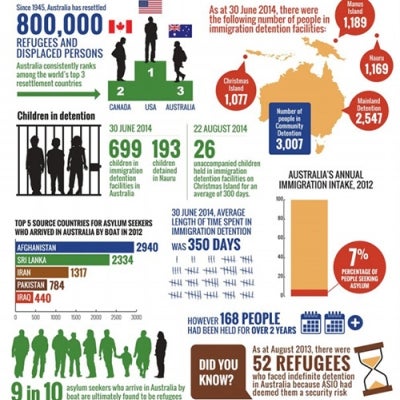Refine results
-
Legal14 December 2012Webpage
Federal Discrimination Law 2005: Chapter 3: The Racial Discrimination Act
The RDA was the first Commonwealth unlawful discrimination statute to be enacted and is different in a number of ways from the subsequent SDA, DDA and ADA. This is because it is based to a large extent on, and takes important parts of its statutory language from, the International Convention on the Elimination of all Forms of Racial Discrimination ('ICERD').1 -
14 December 2012Book page
17. Major Findings and Recommendations of the Inquiry
In addition to the detailed findings in each of Chapters 5-16, the Inquiry has made the following major findings in relation to Australia's mandatory immigration detention system as it applied to children who arrived in Australia without a visa (unauthorised arrivals) over the period 1999-2002. -
Rights and Freedoms14 December 2012Speech
"Armenia to Rwanda - Genocide in the 20th Century - Has humanity learnt anything?": Dr Sev Ozdowski OAM (2004)
In so doing however I am confronted with the classic dilemma of many, namely what fresh insight can I bring to bear on this subject that has not already been canvassed. -
Rights and Freedoms14 December 2012Speech
"The Content of an Australian Bill of Rights": DR SEV OZDOWSKI OAM (2002)
It is a pleasure to be able to address you today and I would first like to acknowledge the Gadigal people, the traditional custodians of the land on which we stand. -
Rights and Freedoms14 December 2012Publication
Human Rights and Mental Illness
The Report of the National Inquiry into the Human Rights of People with Mental Illness was tabled in Parliament and publicly released on 20 October, 1993. Over a three year period the Inquiry received nearly 900 written submissions, heard from over 450 witnesses at formal hearings and consulted with approximately 300 people at forums and informal meetings. -
Commission – General14 December 2012Speech
Creating a culture of human rights compliance
Debates about a charter of rights are often monopolised by the contentious issue of the proper role of the courts. While this is undoubtedly an important question, it overlooks the impact a charter would have on the role of Parliament as a guardian of rights of freedoms. -
Children's Rights1 December 2016Publication
What does the Children's Rights Report 2016 say?
Every year, the National Children's Commissioner provides a child-friendly version of her Children’s Rights Report. This is the child friendly version of the 2016 report, which looked into the Optional Protocol to the Convention against Torture (OPCAT) in the context of children and young people detained in youth justice centres or adult facilities. -
Legal14 December 2012Webpage
National Human Rights Consultation - Appendix 4
The Canadian Charter of Rights and Freedoms guarantees the rights and freedoms set out in it subject only to such reasonable limits prescribed by law as can be demonstrably justified in a free and democratic society.[13] -
Education4 April 2016Webpage
Equal Love: LGBTQIA+ Rights
Equal Love: LGBTQIA+ Rights promotes equal human rights regardless of sexual orientation, gender identity, or intersex status, combating homophobia and transphobia for inclusivity. -
Aboriginal and Torres Strait Islander Social Justice14 December 2012Publication
Promoting Rights for Indigenous Young People with Mental Health Issues
Part 1: Why do we need this research? Arguing for protection, prevention and knowledge for Indigenous young people with cognitive disabilities and mental health issues -
Aboriginal and Torres Strait Islander Social Justice14 December 2012Speech
LAUNCH OF THE NATIVE TITLE AND SOCIAL JUSTICE REPORTS
The two reports launched in Adelaide today provide a scorecard on how Australian governments are meeting their obligations to ensure that Australia's Indigenous peoples can fully exercise their rights and interests. -
Education25 February 2015Webpage
Face the facts: Lesbian, Gay, Bisexual, Trans and Intersex People
Learn how freedom from discrimination is a fundamental human right that belongs to all people, regardless of sexual orientation or gender identity. -
Education25 February 2015Webpage

Face the facts: Asylum Seekers and Refugees
Statistics from 2014 Back to main Face the Facts page All people are entitled to protection of their human rights, including the right to seek asylum, regardless of how or where they arrive in Australia. Australia has ratified the Convention Relating to the Status of Refugees 1951. This Convention defines who is a refugee, sets out the basic rights that countries should guarantee to refugees… -
Rights and Freedoms14 December 2012Speech
Launch of Give Me Shelter: Dr Sev Ozdowski (2001)
Lord when was it that we saw you hungry and gave you food or thirsty and gave you to drink; a stranger and we welcomed you, naked and clothed you, sick or in prison and we visited you? -
Employers18 February 2015Webpage

Age discrimination
Learn how age discrimination occurs when a person is treated less favourably because they are considered to be too old or too young. -
Asylum Seekers and Refugees8 January 2014Publication
A last resort? National Inquiry into Children in Immigration Detention
This is an important report. It deals with our treatment of children in the most recent wave of boat people seeking refuge and a better life on our shores. It does so in the knowledge that there is a tension created by the community expectation that the Government will defend Australia's security while simultaneously upholding individual rights - the notion of the 'fairgo' for all. The report… -
Employers18 February 2015Quick Guide
Discrimination
Employers have a legal responsibility to take all reasonable steps to prevent discrimination. Find out more in this quick guide. -
LGBTIQ+14 December 2012Opinion piece
The path to social inclusion (2009)
Killing and physical violence, exclusion from families and local communities, bullying at school and in the workplace – these are all experiences of gay, lesbian and gender diverse people in various parts of the world. -
14 December 2012Book page
Native Title Report 2003 : Chapter 2 : Native Title Policy - State and Commonwealth profiles
Human rights principles require that Indigenous people's relationships to land, based on traditional laws and customs, be given legal recognition and protection. International legal principles also recognise that Indigenous peoples have economic, social and cultural human rights. Native title, as it is constructed through the Australian legal system, has a limited capacity to meet these human… -
Legal14 December 2012Webpage
Submission - Proposed minor native title amendments (2009)
You are all aware of the cultural, linguistic and historical factors that impact upon Indigenous people’s interaction with the legal system. Such factors that include:
